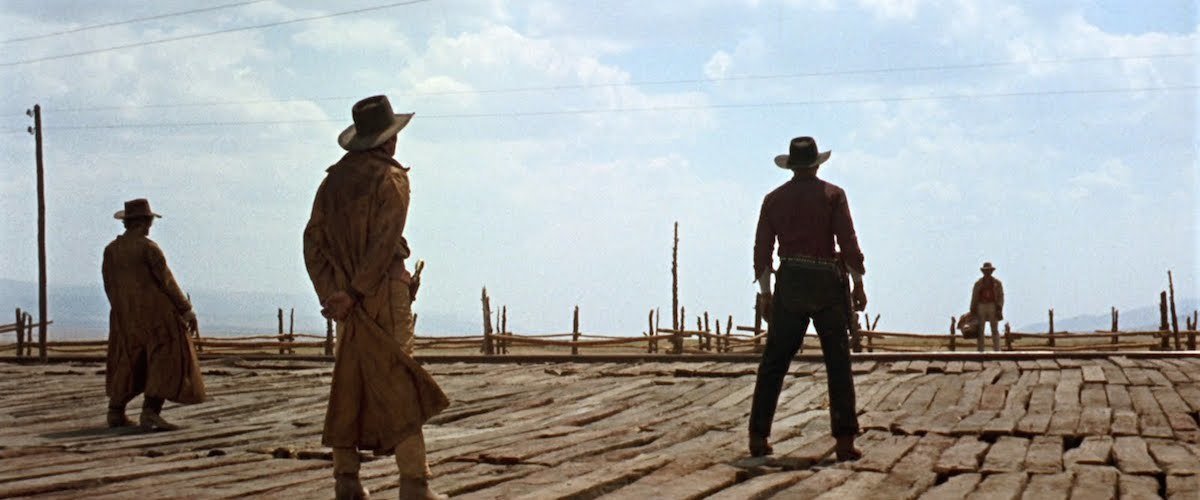
Pre
This is a classic spaghetti western, directed by Sergio Leone with music by Ennio Morricone.
Unlike a lot of my favorite westerns, Clint Eastwood does not make an appearance (though Leone offered him the role of the protagonist and he turned it down).
Post
When I was a kid, I was into Westerns. I think my Dad turned me onto them. My favorites were things like The Outlaw Josey Wales, Silverado, and Tombstone (“I’m your huckleberry” is a line that still kind of gives me goosebumps). And, of course there was the Steve Martin classic The Three Amigos.
When there was nothing else on, I would watch some classics like Shane and John Wayne flix. But I preferred the 80s shoot-em-ups and anything with Dirty Harry / Clint Eastwood if I had my pick.
I didn’t watch a ton of the spaghetti westerns growing up. I first did a tour of them when I was in college or right after, maybe, I think as a result of hearing dope Ennio Morricone tunes in Tarentino films and taking this inspiration to go deep and see what the spaghetti westerns were all about.
I remember as a kid having a Smith and Wesson Colt 45 looking cap gun with a plastic belt and holster and going outside to play cowboys immediately after I watched any Western. I think by the time I was a kid parents were already dissuading the “cowboys and indians” thing from the 50s or whenever that was, so we just played black clothes villains against white hilted good guys, black hilted cap guns vs white hilted cap guns.
I remember when I started re-visiting the spaghetti westerns via Tarentino and wondering why these westerns were part of the classic film canon–why would an Italian director from the 60s and 70s revisit the sort of cheesy / campy genre of a decade or more earlier?
Authority in the American West
For both children and storytellers, I think the ‘wild west’ is a landscape where you can explore a world without established authority structures.
As a child, the well defined and ever present sources of authority are parents and adults.
As an individual member of society–particularly post WWII modern society–authority is similarly well defined in most of our lives.
In post WWII Europe, this authority was labeled the military industrial complex. In America for much of the past century authority was very clearly imbued in institutions like the US Military and federal government, corporate hierarchy, mainstream media, and advertising (the voice of consumer capitalism telling us what we should revere and how we should express our values through purchasing behavior).
These institutions were a ubiquitous and stable source of order and hierarchy for so long that it became easy to forget that their authority was some mixture of earned, arbitrary, and miraculous.
Since reading Martin Gurri’s excellent recent book The Revolt of the Public and the Crisis of Authority in the New Millennium, I have become much more aware of the fragility of the socially constructed fabric and authority of these institutions, more aware the growing awakening of the general public to the fact that none of the emperors are wearing any clothes.
The American West is an ideal landscape for exploring the behavior of individuals and groups operating without any of the constraints or benefits of modern institutional authority. It’s a sort of picturesque Hobbesian state of nature where, as a storyteller, you can pose questions like:
How much of our daily behavior and social interactions are a direct product of our knowledge of institutional authority and confidence it will be enforced?
What kinds of cultural norms are the first to emerge in a frontier society, before they become codified as laws, and how are they enforced?
What kinds of individuals obtain power and authority and what are the various means of doing so?
What compels moral action and how likely are individuals to adopt a code of ethics in the absence of police enforcement?
As I wrote in Narrative, Intelligence, and AI, fiction is an important tool for running deep simulations of alternative worlds and scenarios, and I think the frontier fiction of the ‘wild west’ is a great environment for understanding how the behaviors of individuals are likely to change if traditional sources of authority and coercion continue to erode.